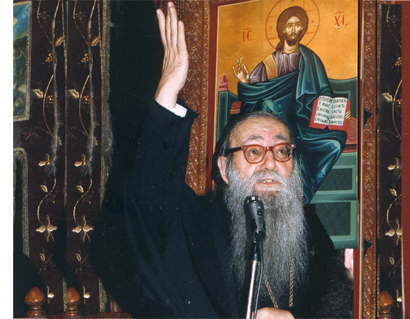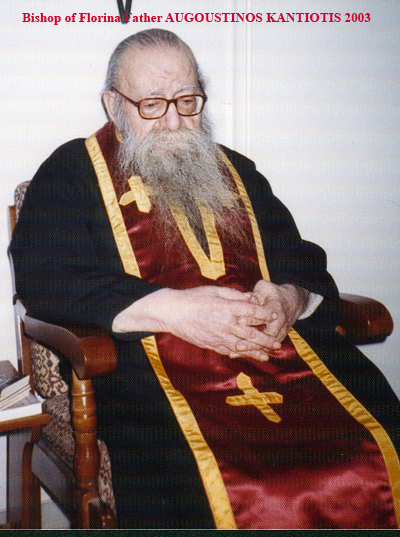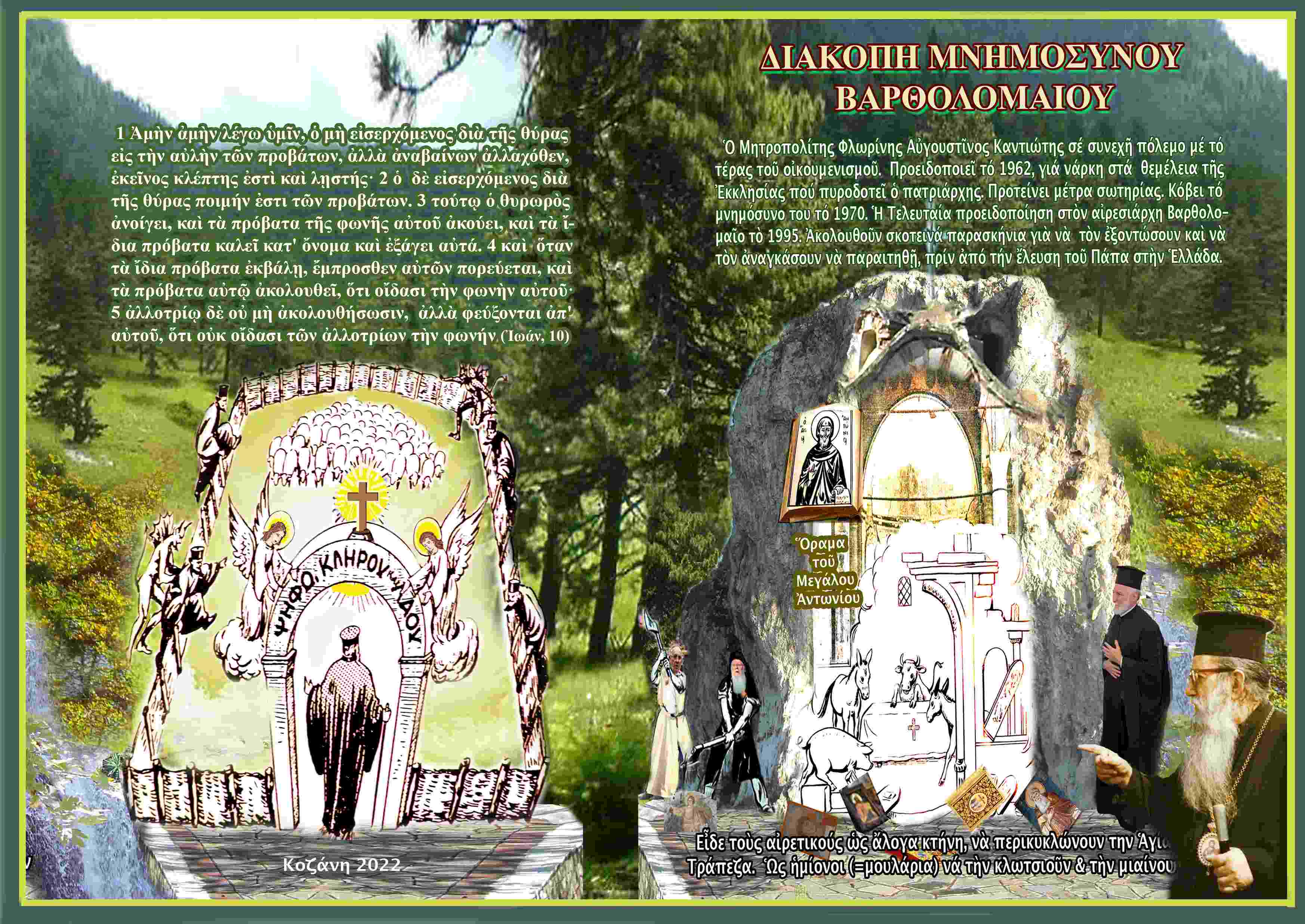A SHORT BIOGRAPHY Bishop of Florina Father AUGOUSTINOS KANTIOTIS
 Μαι 9th, 2010 |
Μαι 9th, 2010 |  Filed under: English, ΒΙΟΓΡΑΦ. π. ΑΥΓΟΥΣΤ.
Filed under: English, ΒΙΟΓΡΑΦ. π. ΑΥΓΟΥΣΤ.
 …Mε βαθιά αγάπη της καρδιάς μου καί πνευματική ευγνωμοσύνη της ψυχής μου, το αφιερώνω στον σεβαστό Γέροντα, στον ανίκητο καί παραδειγματικό μαχητή της ΟΡΘΟΔΟΞΙΑΣ, στόν φωτισμένο ιεράρχη της του Χριστού Εκκλησίας, στόν φλογερό καί ακούραστο ιεροκήρυκα του Λόγου του Θεού, Επίσκοπο Φλωρίνης, πατέρα Αυγουστίνο…
…Mε βαθιά αγάπη της καρδιάς μου καί πνευματική ευγνωμοσύνη της ψυχής μου, το αφιερώνω στον σεβαστό Γέροντα, στον ανίκητο καί παραδειγματικό μαχητή της ΟΡΘΟΔΟΞΙΑΣ, στόν φωτισμένο ιεράρχη της του Χριστού Εκκλησίας, στόν φλογερό καί ακούραστο ιεροκήρυκα του Λόγου του Θεού, Επίσκοπο Φλωρίνης, πατέρα Αυγουστίνο…
ΧΡΙΣΤΕ ΒΟΗΘΕΙ ΕΠΙΣΚΟΠΟ ΑΥΓΟΥΣΤΙΝΟ!
With deep love from my heart and with a whole lot of gratitude from my soul, I dedicate this work to the honorable Elder, the exemplary champion of Orthodoxy, the enlightened hierarch of the Church of Christ, the fervent and the restless preacher of the Word of God, Bishop of Florina Father Augoustinos
LORD GOD JESUS CHRIST HELP BISHOP AUGOUSTINOS!
(This is the prayer that he always
asked the faithful of his audiences to say for him)
A SHORT BIOGRAPHY
SOME OF THE MOST IMPORTANT MOMENTS OF THE LIFE
OF THE CHAMPION OF ORTHODXY
BISHOP OF FLORINA
AUGOUSTINOS KANTIOTIS
1907: He was born in Lefkes on the island of Paros from God-fearing parents Nicholas and Sofia. His father was a shop-keeper and his mother was a teacher. He is baptized with the name Andrea.
1915-1925: He was granted a scholarship to study in the Gymnasium of the island Syros. He finished his studies there with excellent grades.
1925: He was admitted to the Theological School of the University of Athens.
1929 (December): He graduated with “excellent” grades.
1929-1934: He lived for a few years with his mother in one of the islands in the Cyclades, dedicating his time to studying while teaching at the Elementary School of the island.
1934 (December): One rainy day, while walking, he sees on the ground a small-sized postal envelope. He bends down and picks up the envelope from the mud. The surprise is even greater when he sees that the envelope is addressed to him. Apparently it had fallen accidentally from the bag of the aged postman of the island. He opened it and read it right-away. The Metropolitan of Aetolia-Acarnania Ierotheos invited him to go to Messolonghi and take over the position of the secretary of the Metropolis. He saw this as a call from God and immediately accepted the invitation of the Metropolitan.
1934 (Christmas): Andreas Kantiotis, the son of Nicholas, is the only passenger on the boat to Pireaus, and the captain thought this was strange.
1934-1941: He took over the position of the principal deputy (protosyncellus) in the Metropolis of Aetolo-Akarnania. He gave his very first sermon there in Messolonghi.
1935: He was tonsured a monk taking the name Augoustinos. He was ordained a deacon by the Metropolitan of Aetolia-Acarnania Ierotheos.
1941: He was transferred to the Metropolis of Ioannina where he served as a preacher.
1941 (Christmas): In front of the Italian usurpers and with Metropolitan of Ioaninna Spyridon Vlachos (afterwards the Archbishop of Athens and all Greece) officiating the Devine Liturgy, he preached patriotic messages from the pulpit. The Italians, greatly displeased by this, gave an order for his immediate arrest. The Bishop didn’t allow him to preach in order to protect him. Then, the preacher Augoustinos, seeing that he is no longer needed there decided to leave. He departed during wild winter storm leaving his mother behind. The Italian secret police searched his house and when they didn’t find him they arrested his elderly mother.
1942: He arrives in Macedonia. In Yannitsa he learns from a Greek officer about the order for his arrest by the Italians.
1942: In Yannitsa the Metropolitan of Edessa and Pella Panteleimo ordained him to the priesthood.
1942: In the same year he was transferred to the Metropolis of Thessaloniki from where he undertakes successive trips to Kilkis, Veria, Edessa and then Florina (a city in northern Greece). In Florina, he criticized the local Metropolitan Vasilios from the pulpit. He criticized him because while being the Bbishop of Florina he spent most of his time residing in Athens coming to Florina only on Christmas and Easter. The Metropolitan, being in Athens, is informed about this by phone and immediately sends a telegraph ordering the removal of Augoustinos. In reality this worked out for the better because by leaving Florina the preacher Augoustinos escaped a greater danger. The Germans occupiers had arrested 10 patriots of Greece in the area and burned them alive outside the village Proti – near Florina. Surely he would have been among the executed.
1943-1945: He is transferred to Kozani (a city in northern Greece). The Metropolitan of Kozani Ioakim Apostolidis had already left the city for the mountains. All the villages around there were being burned by the Germans and the people fled to the city. Hunger and death was wide spread. The preacher Augoustinos, during these very difficult times appeared like an Angel of God and saved the city and all the inhabitants in it. Using whatever means he could he created and managed a local soup-kitchen. These were daily meals which on certain days reached 8,150 meals. This was truly a miracle which he attributes to this day to Saint Nicholas. Saint Nicholas is the patron Saint of the city of Kozani. Many times the Germans (especially the Gestapo) had condemned him to death and sought his execution but God was always on his side and protected him!
1945-1947: He was transferred to the Metropolis of Grevena.
1947-1950: He was called up as an army priest and preacher serving the 2nd Brigade of the Hellenic Army that had its headquarters in Kozani.
1949: From the pulpit of the military Church of Saint Athanasios of Kozani and in the presence of the country’s leaders, he forbid the chanting of the Polychronion (“many years” chant) for King Paul of Greece. King Paul was a very powerful man at the time. In his sermon he referred to him as not being “honorable” as the hymn declares but as “dishonorable.” He harshly criticized him for signing a government order through which Freemasonry was recognized as a philanthropic organization and as such it should be supported by all the Holy Churches and Monasteries of Greece. The thundering voice of this army priest was the beginning of new persecutions and chastisements for the preacher Augoustinos. Finally, the King recognized his mistake and withdrew his signature from the pro masonic order and stoped all condemnation against the preacher Augoustinos.
1950-1951: He was transferred to the Metropolis of Karystia, with its headquarters in Kymi (an ancient city in Euboea, Greece).
1951-1967: Archbishop Spyridon Blachos assigned him to be the official preacher of the Archdioceses of Athens. This period of his life is a time of great spiritual activities and battles. It was also a time of persecutions, expulsions and chastisements for the preacher.
1964: He was admitted to the hospital of the “Annunciation of the Theotokos” in Athens for an operation. Following the operation he contracted a bad infection which brought him close to death. All the clergy, the monasteries and the faithful people held prayer vigils. The doctors, trying very hard to save him, could only raise their hands towards heaven and announce that only a miracle of God could bring him back to life. They even predicted the hour of his death. And on what was supposed to be the “last night” of his life, they sent a young doctor to stand by his death-bed until his final hour. The miracle was granted. The hour that was determined by the doctors to be the hour of his death, became the moment when the high fever broke all of a sudden and his heath takes the road to recovery. After 60 days of convalescing he was released from the hospital. He himself declared at that moment with a sense of awe and prayer: “Why, my Lord and God, did you bring me back to this life? What plans do you have for me?”
1965: The Holy Synod voted to silence him by forbidding him from preaching because of his strong stands against some of the bishops and metropolitans who were caught up in scandals. He objected and fought against the transfer of Bishops which is forbidden by the Holy Canons of the Orthodox Church. The faithful people rushed to his defense and along with the support of the press of that time. The Hierarchy, seeing this kind of reaction immediately withdrew their directive forbidding him to preach.
 1967 (May): Tthe unthinkable took place; on that day, the sun rose from the east – as he always would say! The unsavory and disagreeable preacher, who had found himself most of the time under expulsion and chastisement because of his criticisms, was elevated to the position of a Bishop and was elected Metropolitan of Florina.
1967 (May): Tthe unthinkable took place; on that day, the sun rose from the east – as he always would say! The unsavory and disagreeable preacher, who had found himself most of the time under expulsion and chastisement because of his criticisms, was elevated to the position of a Bishop and was elected Metropolitan of Florina.
1967-2000: He served for 33 years as the Metropolitan of Florina, during which he dedicates himself to the Church of Christ with many sacrifices. He resigned in the year 2000.
2010: He completed 10 years following years of very energetic service at the age of 104 years old. He worships during the Holy Eucharist and other services of the Church in the Holy Monastery of Saint Augustine. Saint Augustine was Bishop of Hippo (in modern day Algeria). The Monastery is located in the city of Florina – this monastery is the last of his dedicated hierarchal work, and from there he continues to give his blessings to the faithful people of our Church.
Humbly translated from the original Greek
by Aleksander P. Filip
May we all have your blessings your Eminence!
ΧΡΙΣΤΕ ΒΟΗΘΕΙ ΕΠΙΣΚΟΠΟ ΑΥΓΟΥΣΤΙΝΟ!
Lord Jesus Christ help Bishop Augoustino!



Add A Comment
You must be logged in to post a comment.